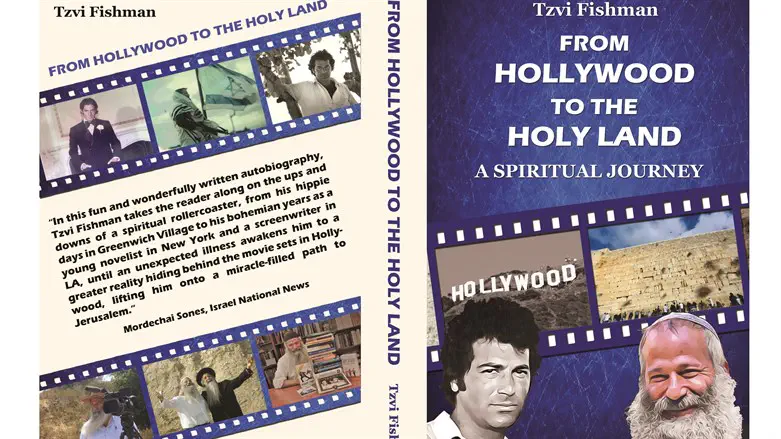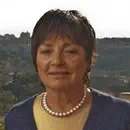
What prompted me to begin to write a review of Tzvi Fishman's book "From Hollywood to the Holy Land, A Spiritual Odyssey" (Am K'Lavi, Jerusalem), the story of a baal tshuva returning to his roots, during the Nine Days that end with the Tisha B'Av fast mourning the destruction of the Temples? Doesn't a story of a baal teshuva, the term which literally means 'one who repents' and is used to describe someone who is newly observant, belong with the op-eds and reviews before the High Holydays, let's say around October?
The answer is that Tzvi's story (available in English on Amazon and in Hebrew at Tsvifishmanbooks.com) is not just a tale of Repentance, it is a story bound up with the idea of Redemption. His personal return to Judaism is paralleled by his realizing that the Jewish People are in the midst of a process of return leading to Redemption in the newly established State of Israel and that he wants to be part of it. His story is akin to that of the Exodus from Egypt where our Sages say the Jews were on the -49th, the lowest level of immorality, but were redeemed by G-d, because in the early chapters of the book, Tzvi sure comes close.
His return symbolizes a national return to roots, literally sowing roots in the Holy Land, but also returning to the concept of being part of a unique people chosen by G-d to receive the Torah and the command to keep its precepts in the land given by G-d to the Jewish nation for eternity. The realization that he has to be in the Holy Land, contribute to its defense and be part of its challenges, its blossoming and its contribution to the world are all part of this baal teshuva's journey. That, to my mind, is what makes the book unique and not simply the well written story of someone who came back to his faith.
Well, praying for and working towards continuing the path that opened up to Redemption, walking in the footsteps of the Messiah, is what the Fast of Av and the days leading up to it are about. Many years before the Jewish state was established, women in Jerusalem would whitewash the walls and sweep their homes on the afternoon of the 9th of Av because they wanted to be ready when the shofar of Messiah hopefully resounded at the close of the fast.
And Tzvi Fishman's long journey back to being part of his people parallels how step by step, the Jews as a people are moving closer to Redemption, sometimes stumbling, sometimes falling back, – but moving forward nonetheless.
This is my take on the book, why you are reading it before the 9th of Av, but not to worry, it is not a theological treatise. "From Hollywood to the Holy Land" is a fast moving, most interesting and action-packed story, full of pithy remarks - alternately funny, ironic and perceptive (especially about the secular world), but sometimes sad. (It is, however, regrettable that the printing leaves something to be desired, probably due to financial constraints, and I hope the next edition will make up for that )
I am going to let you read it without ruining any of the stories by telling them in advance.
Fishman, who today produces films, writes books - and composes articles for Arutz Sheva in the wee hours of the morning (look in the Judaism section for one tomorrow)- is a former hippie, California (weed induced) dreamer and body building beach boy who moves up to become a Hollywood screenwriter, novelist, instructor at NYU's prestigious Film School ("the best in America"). His dream is to become the next great American novelist (he has a rude awakening when he meets up with an anti-Semitic publisher who wants him to change his Jewish sounding name)– and when he comes back to Judaism, it is from so far away that Messiah's route seems shorter!
In fact, when one of his sons calls him over to see a film, without telling him why, he is only able to see it by lowering the computer filter level, and it is not a sense of Jewish pride that fills him when he sees his own name as the screenwriter. He writes his hope that his children will forgive the descriptions of that period of his life, because it can, hopefully, cause others to begin the process of return.
As he reminds us, the greatest Kiddush Hashem is said to come out of the greatest Chillul Hashem, strengthening the point by bringing a message of forgiveness from Ezekiel and the writings of Rabbi Avraham Hacohen Kook right at the start of the book.
Fishman's winding path to return begins with a question from an Israeli friend as the two bask in the sun on a California beach: "Why don't you know anything about Judaism?" Why, indeed? Well, since his bar mitzvah was in a church because his parents' Reform Temple was having repairs, our expectations are rock bottom, but somehow the question awakens a need. He has not yet found a place where he feels he belongs or wants to stay, and even a sojourn in Paris leaves him unfulfilled. The city of lights does not kindle a light in his soul.
But Fishman has a way of being in the middle of things. He meets up with two Zionist movers and shakers from Merkaz Harav Yeshiva, Meir Indor and the now late Rav Chazani who enlist his help to get people over to Israel to volunteer, he ends up coming himself – and is hooked. Meanwhile, he experiences an unbelievable personal miracle which allows him to travel to the Holy Land. And at some point in Jerusalem, meet his wife to be.
Fishman says that Torah is like a powerful drug, perhaps a powerful magnet – and he should know, because one of the most meaningful sentences in this book is: 'You know I didn't become religious because I couldn't make it in real life. I tasted success and the pleasures money can buy. But still I felt empty inside.'
Not anymore. The Torah of the Holy Land has worked its magic – and it can do the same for you.

Rochel Sylvetsky made aliya to Israel with her family in 1971, coordinated Mathematics at Ulpenat Horev, worked in math curriculum planning at Hebrew U. and as academic coordinator at Touro College Graduate School in Jerusalem. She served as Chairperson of Emunah Israel and was CEO of Kfar Hassidim Youth Village. Upon her retirement, Arutz Sheva asked her to be managing editor of the English site, a position she filled for several years before becoming Senior Consultant and Op-ed and Judaism editor. She serves on the Boards of Orot Yisrael College and the Knesset Channel.
